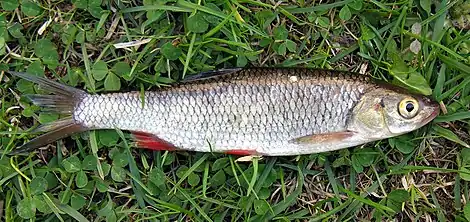< Reconstruction:Proto-Slavic

Reconstruction:Proto-Slavic/klenь
Proto-Slavic

*klenь
Alternative forms
Etymology
Uncertain. It has been suggested to be in an ablaut relation to *klinъ (“wedge”). What speaks for it is that *trěska means “sliver, splinter” as well as “cod”.
Inflection
Declension of *klenь (i-stem)
| Singular | Dual | Plural | |
|---|---|---|---|
| Nominative | *klenь | *kleni | *klenьje, *kleňe* |
| Accusative | *klenь | *kleni | *kleni |
| Genitive | *kleni | *klenьju, *kleňu* | *klenьjь, *kleni* |
| Locative | *kleni | *klenьju, *kleňu* | *klenьxъ |
| Dative | *kleni | *klenьma | *klenьmъ |
| Instrumental | *klenьmь | *klenьma | *klenьmi |
| Vocative | *kleni | *kleni | *klenьje, *kleňe* |
* The second form occurs in languages that contract early across /j/ (e.g. Czech), while the first form occurs in languages that do not (e.g. Russian).
Descendants
- East Slavic:
- Belarusian: клень (kljenʹ) (dialectal)
- Russian: клень (klenʹ) (pre-1918: клѣнь (klěnʹ)), variant: клинь (klinʹ)
- Ukrainian: клень (klenʹ), клінь (klinʹ), клен (klen) (dialectal)
- South Slavic:
- West Slavic:
Further reading
- Trubachyov, Oleg, editor (1983), “*klenь”, in Этимологический словарь славянских языков [Etymological Dictionary of Slavic Languages] (in Russian), issue 9 (*jьz – *klenьje), Moscow: Nauka, page 195
- Snoj, Marko (2016), “klȅn”, in Slovenski etimološki slovar, Ljubljana: Inštitut za slovenski jezik Frana Ramovša ZRC SAZU, →ISBN, page 304
This article is issued from Wiktionary. The text is licensed under Creative Commons - Attribution - Sharealike. Additional terms may apply for the media files.